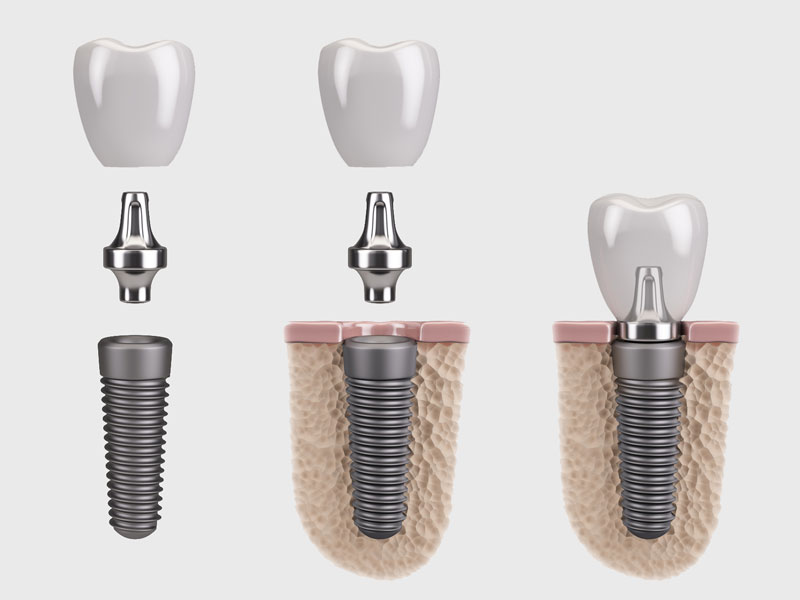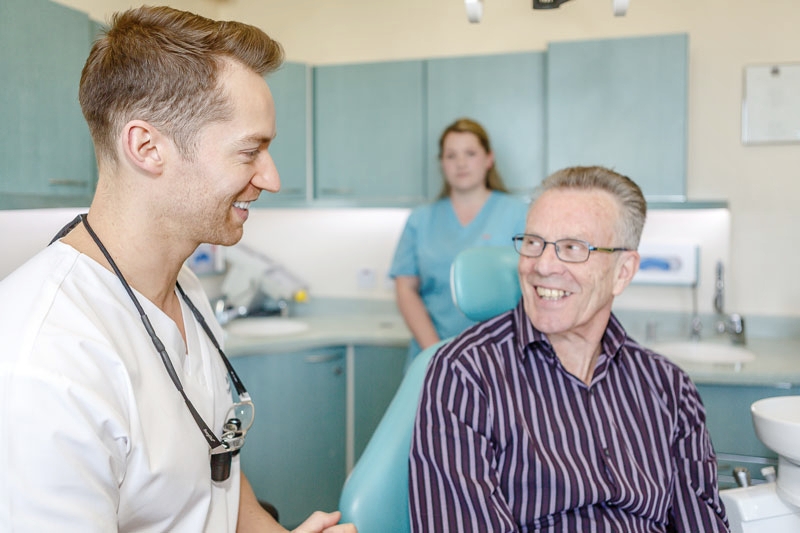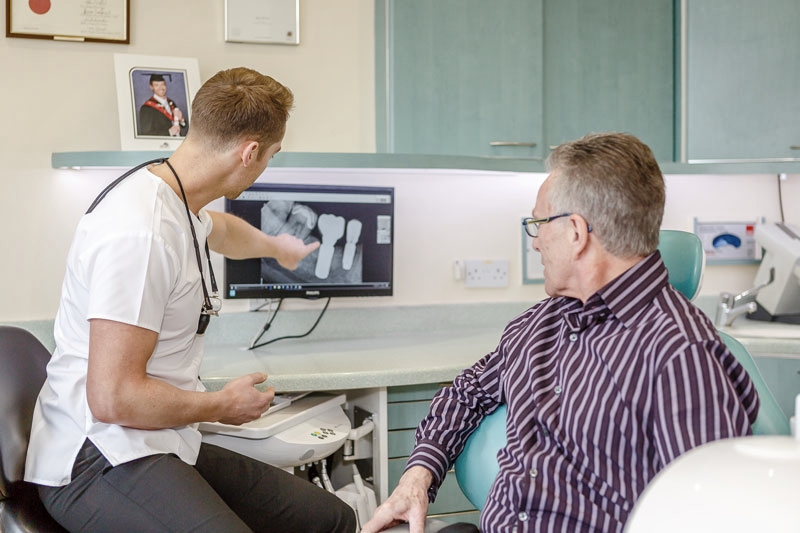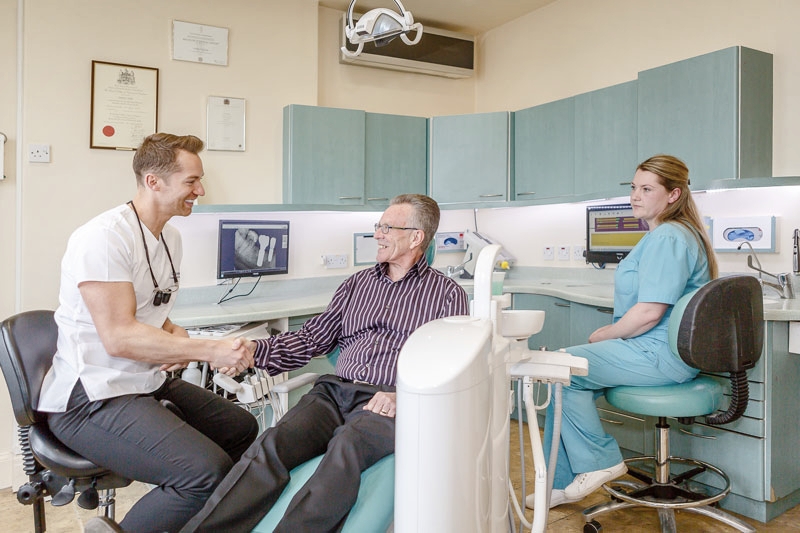Dental implant treatments
Do you have one missing tooth or perhaps a few and feel self-conscious about your smile?
The loss or absence of teeth, be it through dental disease, an accident or congenital defects, can cause overloading of the remaining teeth and affect their long-term viability. Missing teeth can hinder your speech and ability to enjoy food. Your appearance and your confidence in smiling will likely be affected too.
Thankfully, dental implants have revolutionised tooth restoration. Many options exist for the replacement of lost teeth, but the dental implant has gained considerable acceptance as the gold standard choice. For many patients, dental implants can be an effective way of filling those gaps, giving you back a natural looking smile that you’ll want to show off.
is your smile missing something?
Implants for a single missing tooth
A dental implant works by embedding a titanium device (like a small metal post or plug) where your root would previously have sat below the gum line. From here, an artificial tooth can be attached/added/fixed, which I ensure looks the same as your surrounding natural teeth.
Dental implants are ideal for replacing a single missing tooth because unlike a dental bridge, dentists do not need to damage the neighbouring teeth to anchor the restoration.
Implants for multiple missing teeth
Dental implants can also be used to replace multiple missing teeth. This can be achieved by fitting a number of single implants or creating a dental bridge, featuring a number of teeth and fixing this to two or more implants. As with implants for a single missing tooth, implants for multiple missing teeth look natural and will fully restore your bite, function and the aesthetics of your smile.
Confident you.

dental implants - key benefits
Dental implants offer the most successful option for replicating your natural teeth. They have comparable strength and, because I can match their colour and shape to your existing teeth, they look 100% real.
Another benefit of dental implants is that, because they sit in your jaw bone, they can help to prevent the bone degradation that usually occurs once a root has been lost. Bone loss can otherwise cause long-term difficulties, such as problems with your bite, facial definition and even with your speech. By putting an implant into your jaw, new bone tends to grow, preventing these problems.
Other restorations undoubtedly have their place and I use them to create outstanding results but dental implants offer a gold standard. For example, if you wear dentures, you may find yourself worrying about the fit and comfort. It may be difficult to eat what you want or to laugh with confidence. Dental implants take away this worry.
Finally, I can fit a dental implant without having to damage your surrounding healthy teeth in order to create a supporting structure. This offers a clear benefit over a dental bridge.
Fixed teeth in a day
If you have missing teeth or struggle with loose fitting dentures, my 'Implants in a Day' same-day dental implant treatment will transform your smile and your life. The scientifically proven, ground-breaking technique gives you a worry-free, permanent dental solution that looks, feels and works just like natural teeth.
The treatment uses specially constructed titanium rods that are placed at a precise angle, maximising the use of the available bone and avoiding the need for bone grafting. The implants and fixed teeth can be fitted in just one day. Unlike traditional dental implant surgery, Implants in a Day doesn’t take months to complete. The same-day fitting of a set of fixed temporary teeth means there’s no need to worry about wearing dentures while waiting for your implants to heal. Instead, the natural-looking temporary teeth are designed to speed up the healing process. After about three months, your permanent set of new teeth will be fitted - restoring your smile and your confidence.
Smile in a day.

Denture support
If you are a denture wearer or you’ve been told you need dentures, you may be interested in implant-retained dentures. With implant-retained dentures a number of dental implants are fitted at strategic points in your jaw to give the best strength and stability. Natural-looking bespoke dentures can then be created that clip to these implants.
Implant-retained dentures are transforming the denture-wearing experience because they remove any worries about the dentures moving. They also help to reduce bone loss, support your facial structure better, improve your bite and let you eat a wider range of food. They can also minimise the speech issues that are sometimes associated with dentures.
Smile again.

dental implant treatment journey
Initial consultation
I’ll need to see you for an initial consultation, so that I can examine your teeth, talk to you about your individual case and take a detailed medical history. At this stage, I will also take X-Ray images and computer tomographs for three-dimensional imaging. This will enable me to build up a clear picture of your mouth and see whether there is any bone loss of which we need to be aware. Before your implant(s) can be fitted, I will need to make sure you are otherwise dentally fit.
Implant fitting
When I come to fit your implant(s), I’ll give you a local anaesthetic to make the procedure as comfortable as possible. A temporary restoration may be placed on the implant during the healing stage or, if your wear dentures, you may need to wear these while your mouth heals. I will, of course, discuss all of this with you in advance. Approximately one week after your operation, I’ll need to see you to remove the stitches at the implant site. It then takes between six and sixteen weeks for you to heal.
Healing process
I will give you detailed aftercare instructions to follow because it’s essential that you look after your teeth and the implant site to prevent infection. Once the dental implant has healed, I will fit a custom-made crown, bridge or denture (depending on your case) to the implant(s). This will be perfectly matched in shape and colour to your surrounding natural teeth.
Dental implants faqs
Can anyone have implants?
Dental implants have long-term success rates of 93% to 98%, and are well tolerated by the majority of patients. In more complex cases, especially where there has been some bone loss or facial damage, I may need to carry out bone augmentation before we can fit your implant. I would need to assess your individual case to see whether you’re a suitable candidate for implants.
Can you have more than one dental implant?
Yes. Dental implants can be used to replace a single missing tooth, multiple missing teeth or even all your teeth. I can also use implants to fix your implant-retained dentures in place.
How successful is bone augmentation?
The success rate for bone grafts in the jaws for the purpose of placing dental implants is very high. There is a risk that your body will reject the graft, and this risk is higher if you smoke or have certain medical conditions. Again, I would discuss this with you.
How long would my implant treatment take?
Every case is different but I would normally expect to place your final restoration about 18 weeks after the implant is inserted in your jaw. In more complex cases, treatment can take up to 18 months.
Am I too old for implants?
Not at all. As long as you’re dentally fit, there’s no upwards age limit for dental implants.
Can children have dental implants?
Dental implants can only be fitted once the jaw bone has fully developed and finished growing, which means they are not suitable for children.
How safe are dental implants?
Dental implants have an excellent safety record, although they should only ever be fitted by an experienced dental professional. I use leading implant systems that are supported by years of research and successful case studies.
Will I be in a lot of pain?
Your dental implant(s) will generally be inserted under a local anaesthetic to minimise the discomfort of the operation. I won’t lie though - you will experience some pain in the days after the procedure but this can usually be managed well with over-the-counter painkillers and following our recommendations for your post-operative care.
How long will my implant(s) last?
With the right care and attention, your implants have the potential to last as long as your natural teeth. Factors such as smoking and certain medical conditions can reduce the lifespan. If you neglect your teeth, your implants can still get plaque and tartar, which can lead to gum infections, bleeding, bone loss and eventual tooth loss.
What are the risks associated with dental implant surgery?
Although your implant(s) can be fitted under local anaesthetic, this is still a surgical procedure. This means that, as with any surgery, risk factors may vary depending on any pre-existing medical conditions you have, such as diabetes or osteoporosis. I will always take a detailed medical history to properly assess your case and make you aware of the potential risks. I will ensure that your overall oral health is good before we go ahead with fitting your implant.
How do I look after my implants?
Once your dental implants are fitted, you need to look after them in the same way as you would your natural teeth. If you have a bridge fitted to two or more implants, I may need to give you special flossing tools to clean your teeth properly. I will explain all your short- and long-term after-care in detail. As well as brushing and flossing after meals, you will still need to attend your regular check-ups and hygienist appointments.






